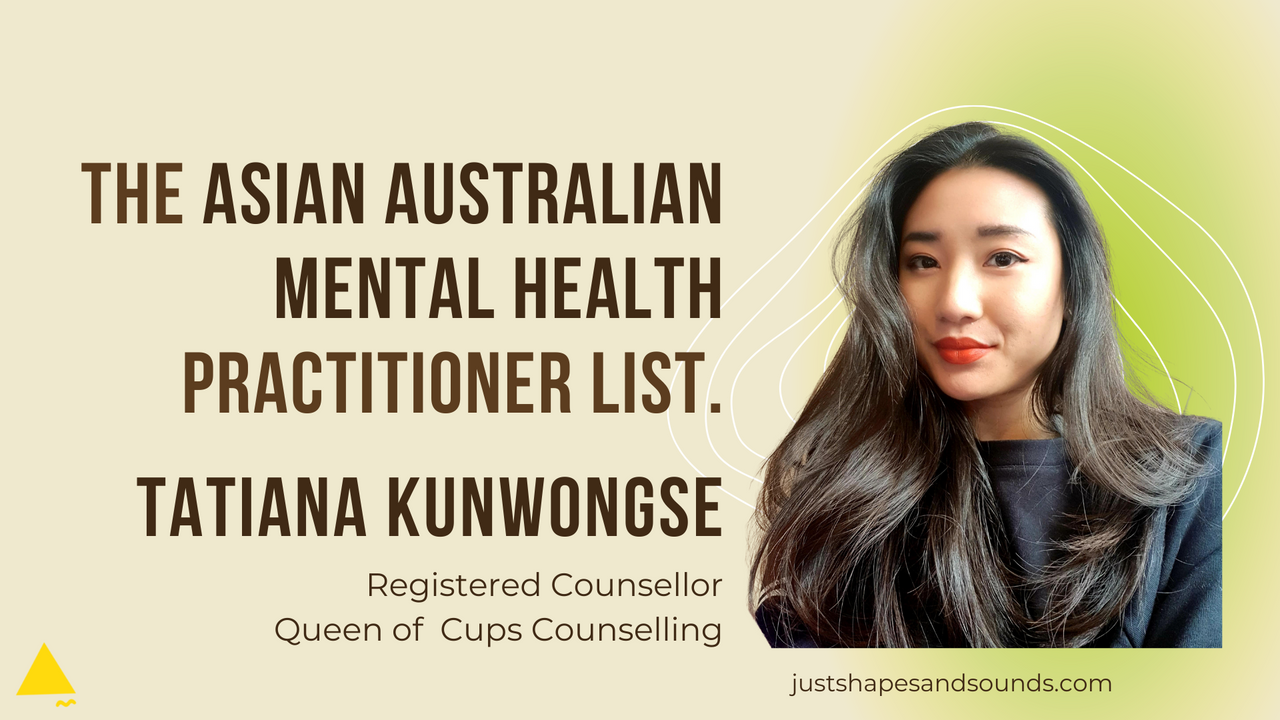Meet Asian counsellor, Tatiana Kunwongse
Nov 29, 2022
We know that it's not always easy trying to work out which therapist we might like to work with: Because the decision isn't just about where they're located and when they're available, but there's a bit more of a human, relational element to the decision too.
So here at Shapes and Sounds, we want to help make that process just a little easier.
Every month, we'll be introducing a therapist from the Asian Australian Mental Health Practitioner List to help you gain a bit more insight into who you feel might be a good fit for you or someone that you know.
This month we're excited to connect you with Tatiana Kunwongse who is a registered counsellor at Queen of Cups Counselling and Kundalini House, in Melbourne. We hope you enjoy connecting with Tatiana below!
~
1. What made you choose counselling as a career?
I studied journalism in university, and I learned through interview assignments that it's truly a privilege to be able to sit with someone and listen to their story. We all have stories, not all of which need to be for broadcast. We have stories just for ourselves and the people closest to us. The stories that matter most, at the end of the day, are the stories we create about who we are and the world we live in. They affect our moods, our health, and the actions we take.
I chose to go into counselling because I want to live in a world where our stories are fundamentally kind. And I’m not talking about Disney-esque happy endings, which can be unrealistic and create added pressure. As a counsellor, I want to help people create stories that feel safe, comfortable, and true to self.
2. What's the difference between a counsellor and a psychologist?
There's overlap between the roles, but there are a few main differences. Counsellors are kind of like General Practitioners but for mental health. We work with a broad range of issues on the day-to-day aspects of mental health, like stress, anxiety, and emotional discomfort. Psychologists are able to treat complex mental health issues and illnesses.
Counsellors also tend to take person-centred approaches to treatment, putting the person first before their symptoms. The overall goal is to help you alleviate smaller emotional pressure points so that you don’t slip into mental illness.
Finally, counsellors don’t make formal diagnoses. We can provide emotional support in living with the diagnosis and understanding how it affects you, and we may collaborate with your psychologist, psychiatrist, or support worker for ongoing behavioural change.
3. What is your unique cultural heritage?
I’m Thai Chinese, but I grew up moving back and forth between Thailand, Canada, and other countries. Not quite from the motherland, not fully North American, I sit in that awkward Third Culture space. I feel lucky to have lived in different cultures, it’s made me more open-minded and aware of how socio-political and economic identities impact people’s lived experience of the world and the stressors they may be dealing with.
4. What are your areas of specialty and what kind of frameworks do you work from?
I work with a broad range of day to day issues, but I’m especially passionate about themes related to anxiety, codependency, ADHD, body image, education and career decisions, and multicultural conflict. I draw from frameworks such as ACT, Mindfulness, DBT, and narrative therapy, and I’m starting to get more involved in somatic therapy.
5. What kind of clients are you best able to support?
Most of my clients are women, but anyone with a mindset for curiosity is welcome to sit with me. I work with individual clients, from ages 14 and up. In the case that your issues are beyond my scope of competent practice (ie. porn addiction, domestic violence, eating disorder treatment), I’ll suggest a referral to a psychologist.
While I will never push my personal beliefs onto you, spirituality is a part of my personal practice, and I can hold that space for you too, if it’s relevant to your healing. Somewhere between chakra points and vision boards journaled into existence, there is wisdom and connection to something larger than ourselves. We can talk about integrating these beliefs into your self-care practice.
5. If you could be your own therapist right now, what do you think you would say to yourself?
You don’t need to know the answers to all the questions. You just need to be able to find the answer to the next one. Can you allow yourself to be surprised by what can happen when you let go of your need for control?
~
Connect with Tatiana via our Asian Australian Mental Health Practitioner List HERE.
Alternatively, if you feel like Tatiana may be a good fit for someone that you know, be sure to forward this page on to them too. Let us continue to not only support ourselves but all those around us too!
If you require urgent assistance, please do not contact Tatiana or any of the practitioners on this list. Instead, please call emergency services on 000 or call Lifeline on 13 11 14.
Shapes and Sounds does not recommend or endorse Tatiana Kunwongse or any of the practitioners listed on the Asian Australian Mental Health Practitioner List.
Please always consult your GP before making changes to your mental health care plan.
💡For community members:
We created the "Essential Guide for Asian Australian Mental Health" by surveying over 350 Asian Australians during Covid-19 lockdowns.
Download our guide and learn about the three most pertinent areas of concern for the Asian community, with tips and strategies to support you through.
🤝For mental health service providers:
Shapes and Sounds supports mental health organisations and teams to feel confident and resourced in providing culturally-responsive care to the Asian community in Australia.
Download our information pack to learn more.
